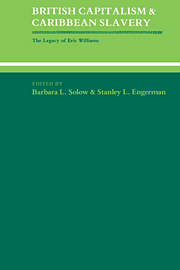Book contents
- Frontmatter
- Contents
- List of Contributors
- Preface
- British Capitalism and Caribbean Slavery: The Legacy of Eric Williams: An Introduction
- Part I Slavery as an Economic Phenomenon
- Part II Caribbean Slavery and the Industrial Revolution
- Capitalism and Slavery in the Exceedingly Long Run
- Slavery and the Development of Industrial Capitalism in England
- The Slave Trade, Sugar, and British Economic Growth, 1748–1776
- Part III The Decline of the British West Indies
- Part IV The Basis of Abolition and Emancipation
- Part V Capitalism and Slavery in Historical Perspective
Capitalism and Slavery in the Exceedingly Long Run
Published online by Cambridge University Press: 15 December 2009
- Frontmatter
- Contents
- List of Contributors
- Preface
- British Capitalism and Caribbean Slavery: The Legacy of Eric Williams: An Introduction
- Part I Slavery as an Economic Phenomenon
- Part II Caribbean Slavery and the Industrial Revolution
- Capitalism and Slavery in the Exceedingly Long Run
- Slavery and the Development of Industrial Capitalism in England
- The Slave Trade, Sugar, and British Economic Growth, 1748–1776
- Part III The Decline of the British West Indies
- Part IV The Basis of Abolition and Emancipation
- Part V Capitalism and Slavery in Historical Perspective
Summary
In the Mediterranean, Europe had developed on a large scale the sugar industry learned from India and the Middle East. Important centres of production were Sicily and Cyprus, and the large plantation and large factory had evolved.… European experience with colonial labor [had evolved] based firstly on the Moorish domination of Spain and secondly on the Portuguese conquest of West Africa.… When Columbus set out for the New World, his equipment included the European wanderlust, a powerful economic impulse, the requisite technical aids, a dominant crusading motive, all backed by the necessary political organization. Above all he took with him the knowledge that Africa was a capacious reservoir of labor which could become (as Gilberto Freyre of Brazil has described the Negro) “the white man's greatest and most plastic collaborator in the task of agrarian colonization.”
European expansion did not begin with Columbus, and the economic organization of the Atlantic economy is not of northern European origin. European expansion started at the end of the eleventh century when Christians from southern and western Europe conquered and exploited economically the lands of Muslim Palestine. The wave of expansion moved from east to west, terminating in the New World; in form and content it was one continuous movement. Atlantic colonization cannot be understood without considering the late medieval colonies of the Mediterranean, the Atlantic archipelagoes, and a large part of Africa, as well as the American continent and the countries of northern Europe. The network of trade routes and of the international balance of payments joined Brazil with England, Madeira with Boston, Newfoundland with the Mediterranean, Holland with the West Indies, and Africa with northern Europe.
- Type
- Chapter
- Information
- British Capitalism and Caribbean SlaveryThe Legacy of Eric Williams, pp. 51 - 78Publisher: Cambridge University PressPrint publication year: 1988



